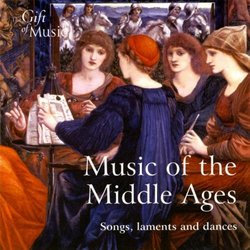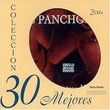| All Artists: Serendipity;The Monks and Novices of St Frideswide;The Oxford Girls' Choir Title: Music of the Middle Ages: Songs, Laments and Dances Members Wishing: 2 Total Copies: 0 Label: The Gift of Music Original Release Date: 1/1/2002 Re-Release Date: 2/2/2006 Genres: Folk, Classical Style: Symphonies Number of Discs: 1 SwapaCD Credits: 1 UPC: 658592105520 |
Search - Serendipity;The Monks and Novices of St Frideswide;The Oxford Girls' Choir :: Music of the Middle Ages: Songs, Laments and Dances
 | Serendipity;The Monks and Novices of St Frideswide;The Oxford Girls' Choir Music of the Middle Ages: Songs, Laments and Dances Genres: Folk, Classical
Music of the Middle Ages Songs, laments and dances A song of love found and love lost, of love unrequited, of love fought for, and of battles won and lost. Instruments and voices explore the music of the past in songs, lam... more » |
Larger Image |
CD Details
Synopsis
Product Description
Music of the Middle Ages Songs, laments and dances A song of love found and love lost, of love unrequited, of love fought for, and of battles won and lost. Instruments and voices explore the music of the past in songs, laments and dances. Lots of variety and colour evoke the medieval world of chivalry and romance. Most works are anonymous, and are taken from manuscripts of the period. This album brings together a wide variety of medieval music, using voices, and instruments in a colourful and fascinating way to bring these ancient notes to new life. The groups making the music are all specialists in their field and have transformed the feint dots, lines and markings of a series of medieval manuscripts into fine sounds: with good tunes and rhythms, this music is both touching and exciting to hear. Serendipity, The Monks and Novices of St Frideswide & The Oxford Girls' Choir The programme has been created with an imaginary garden in mind - a musical garden full of interesting pathways and bowers, where music can be heard. Before the arrival of noisy traffic and the hum of modern suburban life, the garden was the perfect refuge from the stresses and strains of the day. It may have lacked potatoes (not introduced until 1585), but the medieval garden was brimming over with rare herbs and spices, wild roses and all manner of fruits. It was a favourite haunt of young lovers, ideal for summer revels, but above all it was a peaceful place. Medieval music is full of the sights and sounds of the natural world and of the garden, which was in many senses an idealised version of nature. Poets and musicians have always been influenced by their surroundings, and even the humblest rose inspired the blossoming of some of the greatest music of the age. Sometimes the sounds of music making are close, sometimes more distant and mystical. At one point, a pied piper can be heard, whose music arrives and departs as if blown in by the wind! This music is by turn haunting and uplifting, melancholic and joyful. Like medieval poetry, the music is infused with symbolism, and a sense of the grandeur and mystery of the world, a grandeur and mystery not yet spoilt by exploration and scientific discovery. The modern mind seeks answers in the detail and analysis of chemistry and physics. The medieval mind looked to the stars and to religion for answers and explanations. 'Angelus ad virginum' can be heard just as Chaucer described, performed with pure young voices delicately accompanied by the plucked psaltery. 'Sumer is icumen in' reminds us of good times to come. Again the sweetness of the voices is remarkable, an echo in sound of the album cover, where an idealised world of music and study is portrayed.
Similar CDs
| Twenty 4 Seven Back Again Genres: International Music, Pop Label: Avex Trax Japan | |

 Track Listings (23) - Disc #1
Track Listings (23) - Disc #1

